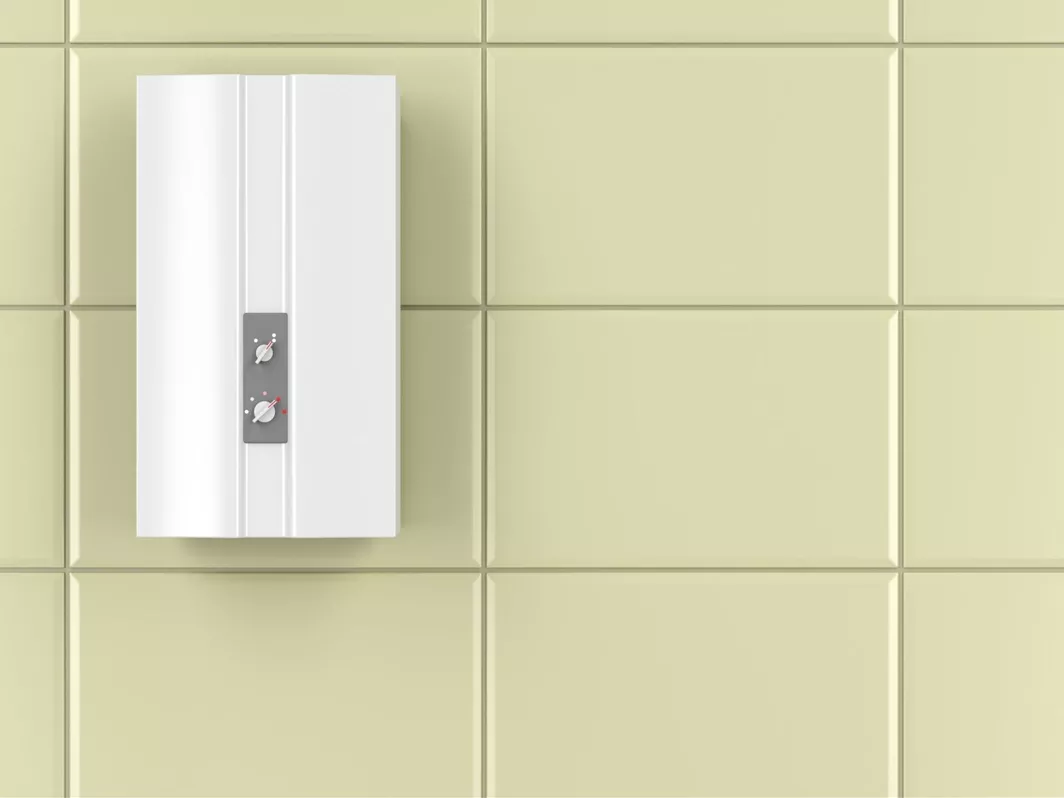How Does a Tankless Water Heater Work?

Tankless water heaters, also known as “on-demand” water heaters, have been gaining popularity in recent years due to their efficiency and convenience.
Unlike traditional storage tank water heaters that store a large amount of hot water in a tank, tankless water heaters heat water only when needed. This means there is no standby heat loss, which is great news if you’re looking to reduce your energy bills. Plus, you’ll no longer endure any household arguments about “who used up all the hot water.” Since tankless units are on-demand, you always have hot water when needed.
In this blog, we’ll explore how tankless water heaters work and what makes them an excellent choice for Texas homes. Some of the topics that we’ll cover include:
- How tankless water heaters work
- Gas vs. electric tankless water heaters
- Benefits of tankless water heaters
- Average life expectancy
- Cost and maintenance
You can also check out our blog, “Tank Vs. Tankless Water Heaters: Which Is Best for My Home?” to learn more.
Schedule a free estimate for a tankless water heater today!
To get honest advice and upfront pricing on a tankless water heater installation, call Jon Wayne today at (210) 239-2892. We’ll review your home’s hot water needs and then provide our expert recommendations suited to your budget. We can also discuss our affordable payment plans if needed. For trustworthy service backed by more than 20 years of proven 5-star ratings, send for Jon Wayne today. We’ll take excellent care of you!
How Tankless Water Heaters Work
Tankless water heaters heat water as it flows through the unit. The water is heated by a gas burner or an electric element as it passes through a heat exchanger. When a hot water tap is turned on, cold water enters the unit and is instantly heated by the heat exchanger. As the water heats up, it flows out of the unit and to the tap. The water heater will continue to heat water as long as there is demand for hot water.
Flow Rate
That said, it’s important to note that the unit’s flow rate must be sufficient to meet the hot water demand of your home, or else there may be a decrease in temperature or pressure. For example, if someone is in the shower while another person is doing laundry and dishes, you may experience lukewarm water if the tankless unit’s flow rate isn’t high enough. However, the moment that one of the multiple hot water taps gets turned off, hot water will be restored instantly. Unlike a tank water heater, you won’t have to wait for the water to heat up again. Rather, it’s about how much hot water is needed at one time.
Depending on your household’s hot water routines, you may need to install additional “point-of-use” water heaters throughout the home, with each heater connected only to certain appliances.
Gas Vs. Electric Tankless Water Heaters
When it comes to power, you have the option of a gas or electric tankless water heater. Gas-fired units tend to be more popular since natural gas tends to be cheaper.
How Gas Tankless Water Heaters Work
Gas-fired tankless water heaters work by igniting a burner when there is a demand for hot water. The burner heats the heat exchanger, which heats the water as it flows through the unit. The amount of heat generated by the burner can be adjusted to match the hot water demand. The unit also has a safety mechanism that shuts off the gas supply if the flame goes out or if there is a problem with the unit.
How Electric Tankless Water Heaters Work
Electric tankless water heaters use an electric element to heat the water as it flows through the unit. When a hot water tap is turned on, cold water enters the unit and flows through the heat exchanger. The electric element heats the water as it passes through the exchanger, and the hot water flows out of the unit and to the tap.
Benefits of Tankless Water Heaters
Tankless water heaters offer several benefits over traditional storage tank water heaters. One of the primary benefits is their energy efficiency. Tankless water heaters only heat water when it is needed, which reduces standby heat loss and can save energy and money on utility bills. According to the U.S. Department of Energy, tankless water heaters can be 24-34% more energy-efficient than storage tank water heaters for homes that use 41 gallons or less of hot water per day.
Tankless water heaters also offer an endless supply of hot water. Since the unit heats water as it flows through the unit, there is no limit to the amount of hot water that can be produced. This is especially beneficial for households that have a high demand for hot water.
Another benefit of tankless water heaters is their space-saving design. Without a bulky storage tank, they can be installed in a closet or on a wall, freeing up valuable floor space in your home.
Average Life Expectancy
Compared to traditional tank water heaters which last around 8-10 years, tankless systems can last 20+ years, provided they’re well maintained. This is a huge factor to consider when deciding on a tankless water heating system. Tankless units are substantially more expensive to install, but with more than double the life expectancy of a tank water heater, the energy savings can be worth it.
Of course, if your unit is not maintained properly, its lifespan can be significantly reduced. It’s important to schedule regular maintenance for your tankless water heater and address any issues promptly to ensure it continues to operate efficiently and reliably for years to come.
Cost and Maintenance
On average, tankless water heaters cost $7,000 to install, which is much higher than the average $2,100 for a tank water heater installation. However, as we mentioned above, the energy savings and convenience that a tankless system provides is often well worth the extra upfront investment. Especially here in Texas, where we’ve seen rising electricity costs.
As far as maintenance is concerned, tankless water heaters will need regular flushings, just as a tank water heater does. This includes cleaning the water inlet filter, flushing the unit to remove mineral buildup, and checking the pressure relief valve. We typically recommend annual maintenance, but depending on your hot water usage, you may need more frequent maintenance visits.
With proper care, a tankless water heater can provide you with an efficient and reliable source of hot water for years to come.
Want to speak with tankless water heating experts? Call Jon Wayne!
Schedule a free in-home estimate with our trustworthy professionals today. We’ll provide you with knowledgeable recommendations and upfront pricing on the best tankless water heaters for your home and budget. Our licensed and highly-trained plumbing technicians provide exceptional workmanship. And we back up our work with up to 5-years parts and labor warranty on qualified new equipment. Contact us today and see why thousands of Texas homeowners have rated us a 5-star company!
